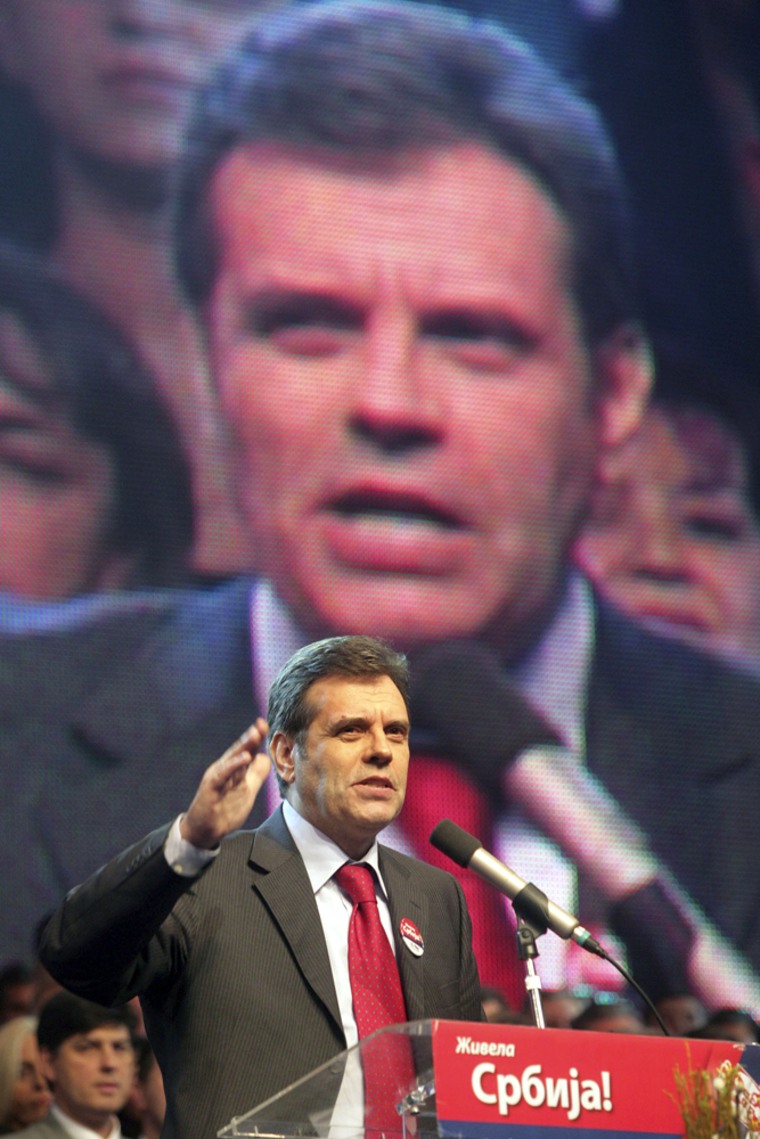Serbia's government collapsed Saturday over an impasse between the nationalist prime minister and the pro-Western president on how Kosovo's independence affects the Balkan country's pursuit of EU membership.
"The government, which does not have united policies, cannot function," Prime Minister Vojislav Kostunica said as he announced the fall of his Cabinet. "That's the end of the government."
Kostunica said he will convene a session of the caretaker government Monday, which will propose to President Boris Tadic to dissolve the Parliament and call new elections for May 11.
Tadic said in a statement that he will call early elections because they are a "democratic way to overcome the political crisis."
The Cabinet, made up of Kostunica's conservatives and Tadic's pro-Western Democrats, was formed in May, following months of strained negotiations in the wake of the last parliamentary elections in January 2007.
The new elections will determine whether Serbia will continue on its path toward the EU and other Western organizations, or return to the international isolation of late strongman Slobodan Milosevic's warmongering era in the 1990s, which is epitomized by Kostunica's hard-line policies.
Tadic disputed Kostunica's claim that their clash was over Kosovo, the Serbian medieval heartland that proclaimed independence last month with the backing of the U.S. and several EU countries.
"Kosovo is of course an integral part of our country," Tadic said.
"I believe the issue is that the Serbian government does not have a united position over European and economic perspectives of Serbia and its citizens," he added.
Kostunica said "the government will function in a reduced capacity until the elections are held."
'With or without Kosovo'
Kostunica accused pro-Western ministers from Tadic's camp of failing to support his efforts to preserve Kosovo as part of Serbia. Kostunica denounced the Democrats for seeking close ties with the European Union even though several of the bloc's states recognized Kosovo's statehood.
"All parties want Serbia to join the EU, but the question is how — with or without Kosovo," Kostunica said. "There was no united will (in the government) to clearly and loudly state that Serbia can continue its path toward the EU only with Kosovo."
The government in Pristina declared independence from Serbia on Feb. 17. Kosovo had been under U.N. control since 1999, when NATO launched an air war to stop a Serb crackdown on separatists.
But Serbia has rejected the move by Kosovo's majority Albanians as illegal under international law.
Kostunica insists that EU governments that recognized Kosovo must rescind their decisions before Serbia resumes pre-membership talks with the 27-nation bloc.
Tadic opposes tying Serbia's EU membership to the issue of Kosovo, which has been recognized as an independent state by several leading EU nations, including Britain, France and Germany.
Pro-Western minister Mladjan Dinkic said Kostunica's decision was "honorable, democratic and the only possible solution."
"Anything else would be an agony," Dinkic said. "It is now honest to ask the citizens which way Serbia will go in the future."
Ultranationalist Serbian Radical Party, the single strongest in Serbia's current parliament, said elections are "a good solution."
"Serbia has been in a crisis for a long time," said senior party official Aleksandar Vucic, swiftly accusing the pro-Western groups of "not recognizing Serbia's territory."
In Kosovo, Deputy Prime Minister Hajredin Kuqi expressed hope Serbia's voters will leave the past behind in the new elections.
"For Kosovo, it is very important to have a government in Serbia that is pro-Western and works for cooperation," he said.
